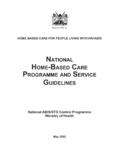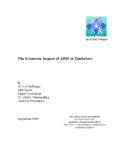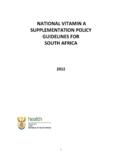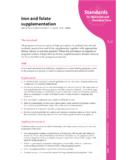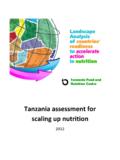Transcription of Improving Nutrition and Reproductive Health: The ...
1 Improving Nutrition and Reproductive health : The Importance of Micronutrient Nutrition Working Paper Series No. 5 January 2000 Improving Nutrition and Reproductive health : The Importance of Micronutrient Nutrition Working Paper Series No. 5 January 2000 This paper was produced for the policy Project by the Micronutrient Initiative under the technical direction of France Begin. It is based on a paper by Sandra L. Huffman, entitled Micronutrients during Pregnancy and Breastfeeding: Improving Safe Motherhood, Pregnancy Outcome and Infant health , and a review of the literature conducted by Mary Mackay, a consultant with the Micronutrient Initiative.
2 Sandra Huffman s paper was presented at the SEAMO-GTZ-UNICEF Workshop on Multi-Micronutrient Supplements and Safe Motherhood, October 30 November 1, 1998. The preparation of Huffman's paper was supported by the LINKAGES Project (Breastfeeding and LAM, and Related Maternal and Young Child Nutrition ), which is funded by the Agency for International Development under Cooperative Agreement No. HRN-A-00-97-00007-00 and managed by the Academy for Educational Development. ii policy s Working Paper Series is designed to make results of technical analyses, research studies, and literature reviews quickly available to interested parties.
3 Papers in the series have not necessarily been widely reviewed, and in some cases, are reports of work in progress. As such, comments and suggestions are welcome. The views expressed in the papers comprising this series do not necessarily reflect those of USAID. iiiContents EXECUTIVE THE EVIDENCE: INTAKES AND THE CONSEQUENCES: SAFE iv Acknowledgments The Micronutrient Initiative, an international secretariat housed within the International Development Research Center (IDRC) in Ottawa, Canada, is grateful to William McGreevey of the Planning and Finance Group of the policy Project for the opportunity to prepare this paper on micronutrient Nutrition and Reproductive health for consideration in policy s work on Value for Money in Reproductive health .
4 This paper benefited from constructive comments by Rae Galloway, Sandra Huffman, Jenny Cervinskas, and Mahshid Lotfi. The Micronutrient Initiative is particularly grateful to Sandra Huffman and Usha Ramakrishnan for providing documents that were not yet published at the time of this writing. The planning, preparation, and revision of this paper was coordinated by France B gin, Senior Program Specialist, Micronutrient Initiative. v Executive Summary The improved nutritional status of women, particularly during their childbearing years, is an important element of Reproductive health .
5 Efforts to improve women s Nutrition and health include increasing food intake at all stages of the life cycle, eliminating micronutrient deficiencies, preventing and treating parasitic infections, reducing women s workload, and reducing unwanted fertility. This paper outlines the critical role of maternal Nutrition and, in particular, micronutrients to Reproductive health . The micronutrient status of women in developing countries affects their health during pregnancy and lactation, the outcomes of their pregnancies, and the health of their infants. For women who are vitamin and nutrient deficient, Improving micronutrient intake can be an important means of reducing maternal morbidity and mortality.
6 Micronutrient malnutrition is primarily the result of inadequate dietary intake. Dietary surveys in developing countries have consistently shown that multiple micronutrient deficiencies, rather than single deficiencies, are common, and that low dietary intakes and poor bioavailability of micronutrients account for the high prevalence of these multiple deficiencies. Recent evidence concerning increased micronutrient supplementation suggests the following findings: Enhancing vitamin A intake reduces maternal mortality. Increasing calcium and magnesium intake can reduce the risk of death from eclampsia.
7 Ensuring adequate intake of iron, zinc, iodine, calcium, magnesium, and folic acid during pregnancy can improve pregnancy outcome. Increasing the intake of folic acid before pregnancy can reduce birth defects. Providing zinc, calcium, and magnesium supplements during pregnancy can improve birthweight and reduce prematurity, especially among high-risk women. Improving the maternal intake of many nutrients directly enhances the quality of breast milk. In addition, micronutrients play an essential role in the function of the immune system, and deficiencies in them influence the rate, duration, and severity of infections.
8 Infection rates during pregnancy or lactation, including Reproductive tract infections, increase because of deficiencies in iron, vitamin A, and zinc. Also, low serum vitamin A levels in pregnant women have been associated with increased transmission of HIV to infants and with increased transition from HIV to AIDS and increased mortality from AIDS among infants. The consequences of malnutrition affect the ability of women to sustain work and care for their families. Solutions to prevent or eliminate micronutrient malnutrition include nutrient supplementation of women of childbearing age before and after pregnancy through repeated Reproductive cycles.
9 Combined supplements are usually more effective in Improving micronutrient status than single supplements, since women are usually deficient in more than one micronutrient. In addition, universal or targeted food fortification, which has proved cost-effective, can be an important strategy in preventing micronutrient malnutrition. vi 1 Improving Nutrition and Reproductive health : The Importance of Micronutrient Nutrition Background Food and Nutrition are essential for good health . However, chronic energy deficiency and stunting among women in developing countries are the results of malnutrition during fetal development, infancy, and childhood with low energy intakes continuing into adulthood.
10 Recent evidence suggests that vitamin A deficiency in women may increase the risk of death. Anemia contributes to 20 percent of the maternal deaths in Africa and 23 percent in Asia and is associated with poor birth outcomes such as low birthweight and prematurity. Mild maternal zinc deficiency has been related to complications of labor and delivery, including placental abruption, prolonged labor, premature rupture of the membranes, and the need for assisted or operative delivery. Also, low calcium intakes have been associated with hypertensive disorders and preeclampsia. An important element of Reproductive health is improved nutritional status of women of childbearing years.



